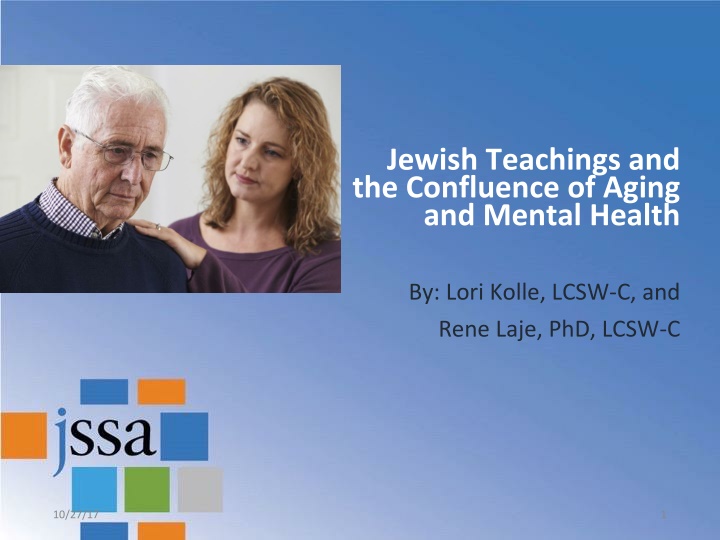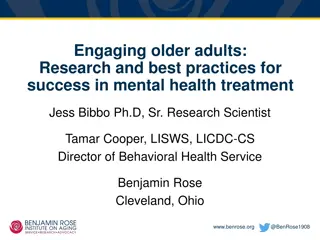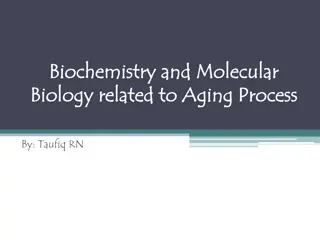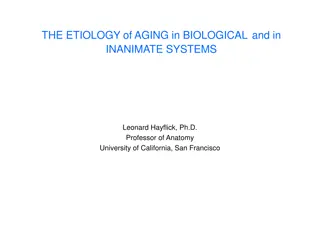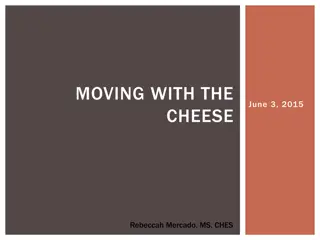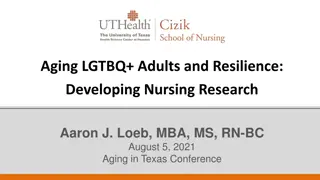Insights into Jewish Teachings on Aging and Mental Health
Explore the intersection of Jewish teachings and the challenges faced by older adults in maintaining mental health. Delve into the impact of aging on mental well-being, common symptoms, multiple losses contributing to depression, therapeutic strategies, and important considerations when addressing depression and anxiety in older clients through a lens of Jewish tradition advocating for continued growth, learning, and respect for elders.
Uploaded on Sep 18, 2024 | 1 Views
Download Presentation

Please find below an Image/Link to download the presentation.
The content on the website is provided AS IS for your information and personal use only. It may not be sold, licensed, or shared on other websites without obtaining consent from the author.If you encounter any issues during the download, it is possible that the publisher has removed the file from their server.
You are allowed to download the files provided on this website for personal or commercial use, subject to the condition that they are used lawfully. All files are the property of their respective owners.
The content on the website is provided AS IS for your information and personal use only. It may not be sold, licensed, or shared on other websites without obtaining consent from the author.
E N D
Presentation Transcript
Jewish Teachings and the Confluence of Aging and Mental Health By: Lori Kolle, LCSW-C, and Rene Laje, PhD, LCSW-C 10/27/17 1
Older Adults and Mental Health According to the CDC Approximately 20% of people over age 55 have a mental health concern The most common symptoms are related to mood disorders and anxiety Older men have the highest rate of suicide than any other age group
Aging and Loss Multiple Losses As We Age That May Contribute to Depression: Health Career/Income Senses (sight, hearing, taste, smell) Spouses/Partners Friends Home Independence (i.e., driving, finances) Mobility
Therapeutic Strategies Different Techniques that Utilize Effective Interventions: Cognitive-Behavioral Therapy Mindfulness Meditation Supportive Therapy Validation Therapy Grief Therapy
Others Issues to Consider When A Client Presents with Symptoms of Depression and/or Anxiety: Consideration of Physical Health Co-Morbidities that May Contribute Changes in Metabolism Use or non-use of Psychotropic Medication Formal and Informal Support System Changes
Jewish Teachings on Aging and Mental Health The Torah considers aging a blessing; old is synonymous with wise and elders are to be treated with deference and respect. Later life is not merely looking back on a lifetime of experience; on the contrary, according to Jewish tradition, old age is a time in which we are called to continue to grow and learn and to broaden our concern and involvement with others.
Jewish Teachings on Aging and Mental Health Jewish Tradition states that aging is a time of meaning and possibility- even as hardships and challenges are acknowledged and as we face our personal and sometimes difficult journeys having some sense of purpose that goes beyond one s self. It takes courage to face the limits of life, and the losses that come with it. There is a phrase attributed to the Hasidic: Jews are forbidden to FEEL old
Pearls of Jewish Wisdom dARsDqZT0KA
Relax According to a study by Hofmann and colleagues (2014), participants with anxiety who received cognitive-behavioral therapy reported a greater quality of life.
Never Stop Learning A study by Yamashita and colleagues (2017) looked at older adults in a lifelong learning institute and found that participation in additional education programs was positively associated with life satisfaction.
Give and Take Musick and Wilson (2003) found that volunteering lowers depression symptoms for those over age 65.
Make the Most of Your Day / Be Present Kuyket et al. (2015) found that mindfulness-based cognitive therapy is as effective as maintenance antidepressant treatment for the prevention of depression relapse in individuals at risk.
Value Your Friends A study by Lee and Kim (2014) showed that adults that had contact with children and contact with friends is associated with lower risk of depression.
Look Forward, but Every So Often, Take a Glance Back
Laugh According to a study by Heo et al. (2016), a combination of simulated laughter, breathing, stretching exercises and meditation significantly improves mood.
Do What You Love, Love What You Do Duffy et al. (2012) found that life satisfaction was associated with living a calling which is a profession that someone feels is purposeful, helps others, and, possibly channels her or his passion.
Case Study #1- Discussion Ms. T is a 87 yr old female who presents with symptoms of depression and reports that she is recently divorced because her husband left her after 34 years of marriage. She used to be very religious and her favorite holiday was Passover, however this year, she wants nothing to do with participating. What intervention techniques may be helpful for Ms. T? Which, if any, principles may be beneficial to Ms. T in coping with this change in her life? Co-morbid and other medical factors and their role in the therapy process
Case Study #2 - Discussion Mr. B is a 90 yr old divorced male with 2 daughters who live on the West Coast. Mr. B had an extraordinary career that was cut short when he was diagnosed with multiple myeloma and stopped working 12 years ago. Although his cancer is now in remission, Mr. B suffers from fatigue which limits his activities. Mr. B presents with loneliness and lack of motivation. What intervention techniques may be helpful for Mr. B? Which, if any, principles may be beneficial to Mr. B in coping with this change in his life? Co-morbid and other medical factors and their role in the therapy process
Resources JSSA Programs: JSSA Senior Services Premier Homecare JSSA Hospice Please contact 301.816.2633 for information
CONTACT INFORMATION Rene Laje, PhD, LCSW-C Program Coordinator, JSSA Mental Health Services rlaje@jssa.org; 301.610.8368 Lori Kolle, LCSW-C Director, JSSA Outpatient Mental Health Services lkolle@jssa.org; 301.610.8374
